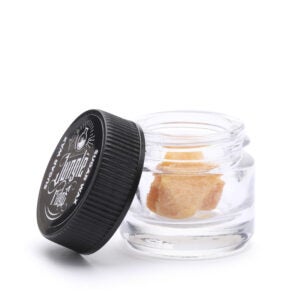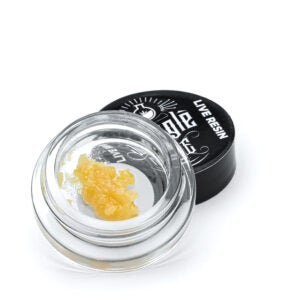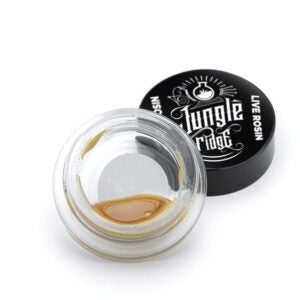Table of Contents
- Unravelling the Mystery of Shatter
- The Benefits of Shatter
- The Drawbacks of Shatterr
- What are Alternatives to Shatter?
- Conclusion
- FAQ
As the cannabis market expands, potent forms of cannabis, such as shatter, have attracted attention. Before diving in, it’s essential to understand what shatter is and weigh its advantages and disadvantages. In this article, we’ll explore shatter, its characteristics, and some alternatives to help you make an informed decision.
Unravelling the Mystery of Shatter
Shatter is a type of cannabis concentrate with a glass-like, brittle texture. It’s produced by extracting cannabinoids and terpenes from cannabis plant matter using butane hash oil or BHO. Shatter can be made from various cannabis strains, which impacts its THC and CBD concentrations.
The Manufacturing Process
Creating shatter involves dissolving cannabinoids and terpenes from the cannabis plant in a solvent, typically butane or CO2. The solvent is then evaporated, leaving behind a highly concentrated substance that is further processed to achieve its distinct glass-like consistency.
The Benefits of Shatter
1. High Potency
With THC levels often around 80%, shatter is one of the most potent forms of cannabis available. This high THC content makes it popular among experienced users seeking more intense high or potent medicinal effects.
2. Flavorful Experience
The extraction process used to create shatter preserves the terpenes, which contribute to its unique and rich flavour. This flavorful profile often surpasses that of other cannabis products.
3. Easy to Dose
Shatter’s consistency allows users to break off a small amount and measure their desired dosage accurately, ensuring a consistent experience each time.
The Drawbacks of Shatter
1. Higher Cost
Shatter is typically more expensive than other cannabis products due to its potent nature and intricate extraction process.
2. Potential Health Concerns
Since shatter is made using solvents, there is a risk of residual chemicals remaining in the final product. When consumed, these chemicals can pose potential health risks, particularly if the shatter is smoked at high temperatures.
3. Legal Issues
Shatter’s legality varies depending on the jurisdiction. In some areas, shatter is subject to stricter regulations than other forms of cannabis due to its high THC content and potential for abuse.
What are Alternatives to Shatter
Wax
Wax is another type of cannabis concentrate with a soft, pliable texture. Like shatter, it is produced using a solvent-based extraction process but has a more crumbly consistency. Wax is slightly less potent than shatter, yet still offers a powerful high and a rich flavour profile.
Live Resin
Live resin is made from fresh, flash-frozen cannabis plants. This extraction method preserves more of the plant’s terpenes, resulting in a highly aromatic and flavorful product. Live resin is known for its full-spectrum cannabinoid profile, providing a more well-rounded experience compared to other concentrates.
Rosin
Rosin is a solventless cannabis concentrate made by applying heat and pressure to cannabis flowers or hash. This process extracts the cannabinoids and terpenes without the use of solvents, resulting in a clean, high-quality product. Rosin is popular among users who prefer a more natural and chemical-free concentrate.
Conclusion
In conclusion, shatter can be an excellent choice for experienced cannabis users seeking a potent concentrate with a rich flavour profile. However, the higher price, potential health risks, and legal restrictions may deter some users. Alternatives like wax, live resin, and rosin offer unique benefits and may be more suitable for those looking for different types of concentrates. Ultimately, deciding if shatter is worth the investment depends on individual preferences and needs.
FAQs
1. What distinguishes shatter from other cannabis concentrates?
Shatter is a type of cannabis concentrate with a glass-like, brittle texture. It is known for its high potency and rich flavour profile, which sets it apart from other cannabis concentrates like wax, live resin, and rosin.
2. How do I consume shatter?
Shatter can be consumed by dabbing, vaporizing, or adding it to a joint or bowl. Dabbing involves using a dab rig, which heats the shatter to a high temperature, vaporizing the concentrate and allowing users to inhale the vapour. You can learn more about how to smoke shatter here.
3. Is shatter safe to use?
Shatter can be safe to use when produced by a reputable manufacturer, ensuring the product is free of residual solvents and contaminants. However, the high potency of shatter can be overwhelming for inexperienced users, and consuming it through high-temperature methods like dabbing can pose potential health risks.
4. Can I make shatter at home?
Making shatter at home is possible, but it can be dangerous due to the use of highly flammable solvents in the extraction process. Purchasing shatter from a licensed dispensary or producer is recommended to ensure a safe and high-quality product. You can read more about how to make shatter at home in this comprehensive guide.
5. Does shatter have any medical benefits?
Shatter can provide medical benefits for individuals who require a high concentration of cannabinoids for symptom relief. Its high potency can be effective for managing chronic pain, anxiety, and other conditions. However, consulting with a healthcare professional before using shatter for medicinal purposes is essential. Discover more about the benefits of shatter here.



